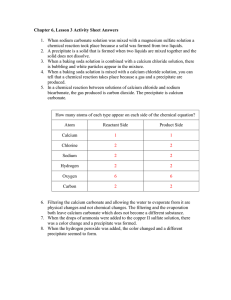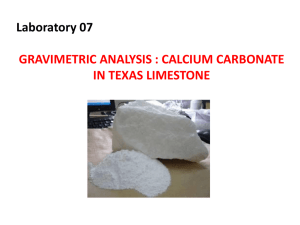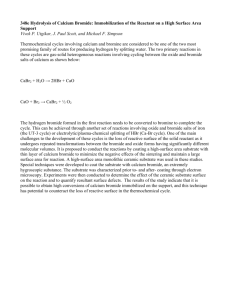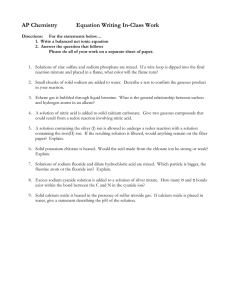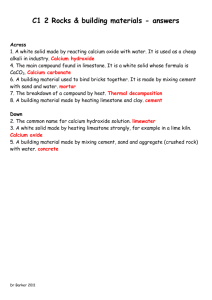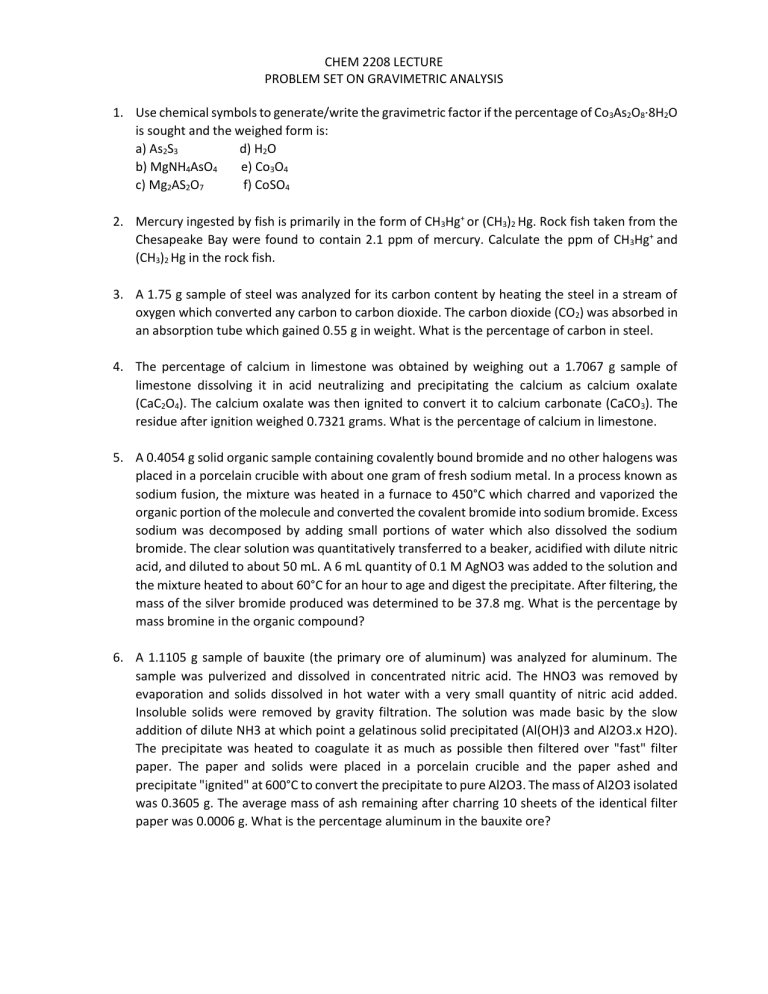
CHEM 2208 LECTURE PROBLEM SET ON GRAVIMETRIC ANALYSIS 1. Use chemical symbols to generate/write the gravimetric factor if the percentage of Co3As2O8·8H2O is sought and the weighed form is: a) As2S3 d) H2O b) MgNH4AsO4 e) Co3O4 c) Mg2AS2O7 f) CoSO4 2. Mercury ingested by fish is primarily in the form of CH3Hg+ or (CH3)2 Hg. Rock fish taken from the Chesapeake Bay were found to contain 2.1 ppm of mercury. Calculate the ppm of CH3Hg+ and (CH3)2 Hg in the rock fish. 3. A 1.75 g sample of steel was analyzed for its carbon content by heating the steel in a stream of oxygen which converted any carbon to carbon dioxide. The carbon dioxide (CO2) was absorbed in an absorption tube which gained 0.55 g in weight. What is the percentage of carbon in steel. 4. The percentage of calcium in limestone was obtained by weighing out a 1.7067 g sample of limestone dissolving it in acid neutralizing and precipitating the calcium as calcium oxalate (CaC2O4). The calcium oxalate was then ignited to convert it to calcium carbonate (CaCO3). The residue after ignition weighed 0.7321 grams. What is the percentage of calcium in limestone. 5. A 0.4054 g solid organic sample containing covalently bound bromide and no other halogens was placed in a porcelain crucible with about one gram of fresh sodium metal. In a process known as sodium fusion, the mixture was heated in a furnace to 450°C which charred and vaporized the organic portion of the molecule and converted the covalent bromide into sodium bromide. Excess sodium was decomposed by adding small portions of water which also dissolved the sodium bromide. The clear solution was quantitatively transferred to a beaker, acidified with dilute nitric acid, and diluted to about 50 mL. A 6 mL quantity of 0.1 M AgNO3 was added to the solution and the mixture heated to about 60°C for an hour to age and digest the precipitate. After filtering, the mass of the silver bromide produced was determined to be 37.8 mg. What is the percentage by mass bromine in the organic compound? 6. A 1.1105 g sample of bauxite (the primary ore of aluminum) was analyzed for aluminum. The sample was pulverized and dissolved in concentrated nitric acid. The HNO3 was removed by evaporation and solids dissolved in hot water with a very small quantity of nitric acid added. Insoluble solids were removed by gravity filtration. The solution was made basic by the slow addition of dilute NH3 at which point a gelatinous solid precipitated (Al(OH)3 and Al2O3.x H2O). The precipitate was heated to coagulate it as much as possible then filtered over "fast" filter paper. The paper and solids were placed in a porcelain crucible and the paper ashed and precipitate "ignited" at 600°C to convert the precipitate to pure Al2O3. The mass of Al2O3 isolated was 0.3605 g. The average mass of ash remaining after charring 10 sheets of the identical filter paper was 0.0006 g. What is the percentage aluminum in the bauxite ore?

